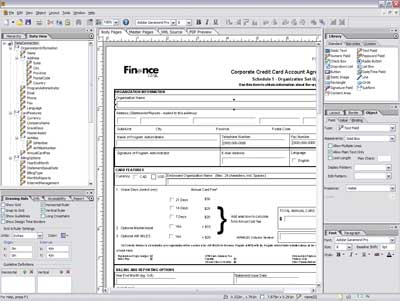| Service Oriented Enterprise |
|
Saturday, March 13, 2004 OpenStorm Blog Ryan, Dave and the crew have kicked off the OpenStorm blog. It will focus more on using the Service Orchestrator and general questions related to BPEL and service composition. See: http://www.openstorm.org I don't see an RSS feed, but I'll ask them to put one up. posted by jeff | 6:35 AM Thursday, March 11, 2004 AT&T and GrandCentral Partner See: http://www.internetnews.com/ent-news/article.php/3324191 "AT&T WebService Connect allows different applications from different sources to communicate without time-consuming custom coding. And because it is XML-based (define), it's not tied to any one operating system or programming language. Developed over the last year with partner Grand Central Communications, WebService Connect plays into AT&T broader strategy of evolving from a long-distance phone company to a provider of enterprise network services. " ... "The service will be rolled out gradually in the coming months. It starts at about $34,000 per month, although prices could run higher depending on usage. In terms of its telecom competitors, AT&T believes it is farthest along in offering Web services (define) to its customers. " Congratulations to GrandCentral! posted by jeff | 2:05 PM Wednesday, March 10, 2004 Jim Waldo clarifies position Jim does a great job clarifying his position on standards: http://www.artima.com/forums/flat.jsp?forum=106&thread=4892 Jim states: Point one: Just because something is called a standard doesn't make it open; and something that isn't a standard is not, because of that, proprietary. Point two: A standards body is often a lousy place in which to invent a technology. Point three: The previous posting was not a veiled (thinly or otherwise) attack on any particular standards group or collection of standards groups. Point four: If there are multiple groups competing to write a standard for the same thing, it is probably a safe bet that the technology being standardized isn't ready for standardization. Well done. I think Jim fully understands it. Sucks doesn't it? Oh well. Now, I'd like to see Jim (the brain behind Jini) take some of his vast knowledge and write a couple new standards... for starters, I think he'd have quite a bit to add to ws-discovery: (ws-leasing, etc.) So, here is the WS-* formula: 1. Find a concern (think separation of concerns, they usually end in "ility") 2. Find a remedy to the concern. 3. Take the name of the concern and put the letters "WS-" in front of it. 4. Use as much protocol (with XML) to describe the remedy, use wsdl and the other ws-specs to weave a full story. 5. Publish your spec. 6. Wait for either MS or IBM to "expand" the idea, change the name and republish it with a higher degree of separation of concerns and a name that has a striking resemblance to the name you gave it. 7. Bicker to the press about it. 8. Wait approximately 6 months. Feel free to knock out your reference implementation during this period. 9. Watch the MS-IBM version become popular. 10. Terminate your version and publicly support the MS-IBM version. Be happy that a spec exists. It really is a very simple, straightforward process. Best of luck. posted by jeff | 9:59 AM Tuesday, March 09, 2004 Supply Chain Orchestration: RFID meets BPEL Last week I made a visit to Boston to meet the people at Connecterra. These guys are in the "RFID middleware" space. This category is often called a 'savant' - although the industry seems to be moving beyond this term. It was absolutely fascinating to see RFID signals get picked up by the readers, be sent to specialized RFID middleware where the signals were aggregated, filtered and eventually turned into web service (soap) calls. These calls could then could be consumed by a BPEL engine for processing. Immediately, the opportunities for "supply chain orchestration" are illuminated. I've been working on a white paper called, "Supply Chain Orchestration" with Bob Betts for the last couple of weeks. The topic is huge - the impact is significant. We should have the paper done in a couple of weeks - I'll post a note when it is available. posted by jeff | 4:49 PM Adobe launches beta of XML/PDF Form Design Software See: Adobe Launches Public Beta of New XML/PDF Form Design Software  "Developers can easily integrate form data with core enterprise systems via XML, OLEDB and web services. Additionally, Adobe Designer allows users to design forms that can be used with digital signature technologies for facilitating secure electronic transactions." Very exciting! posted by jeff | 6:28 AM WS-Discovery and Jini News.com and Ron Schmelzer have once again teamed up to inform the public on web service specifications: Ws-disc and Jini have a discovery component and Jini is a 'java' only thing. A couple other things worth noting: 1. Sun made a huge mistake by not bundling Jini with the J2EE stack early - this killed Jini - it was considered a 'device only' api. 2. Jini is API not a protocol - they later rewrote this functionality as a protocol for Jxta 3. Jini bundled remedies to concerns (leasing, discovery, proxy, service matching and tuple space) in a single spec. My belief is that ws-discovery will catch on as long as people don't say, "The idea is very much the same as Jini". As cool as Jini was, it was doomed by Sun. If you want to describe ws-discovery, say "it's a multicast framework for dynamically finding resources on a net (wan, lan, scatternet, piconet, etc.) without knowing the address of any resources ahead of time." WS-Discovery isn't bundling a ton of things together - it is a lightweight protocol for finding stuff across a variety of networks. It isn't based on a single language and has good support. It can make it - as long as we don't accidentally kill it in the cradle. posted by jeff | 5:47 AM |
|
|||||||||||||||
|
|
||||||||||||||||